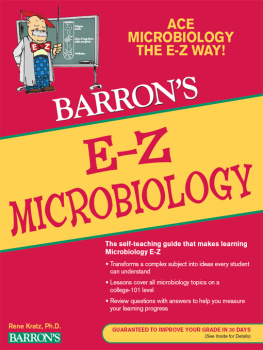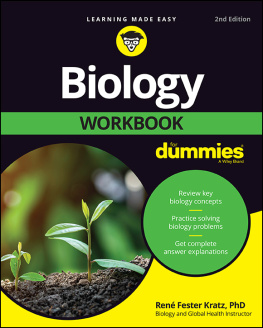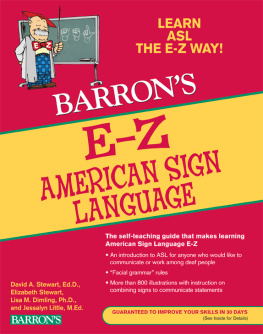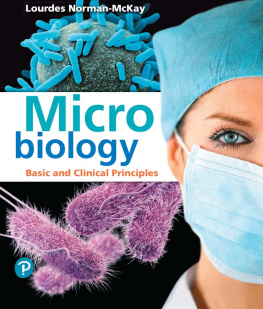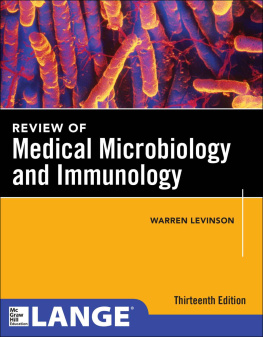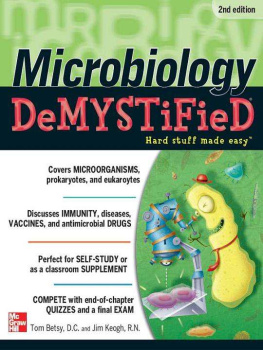
Dedication
This book is dedicated to Dan, Hueston, and Dashiel, who gave up their time with me so that I could work on it, and to my mother, Annette, who flew in and helped run the household while I was busy.
Copyright 2011, 2005 by Barrons Educational Series, Inc.
All rights reserved.
No part of this publication may be reproduced or distributed in any form or by any means without the written permission of the copyright owner.
All inquiries should be addressed to:
Barrons Educational Series, Inc.
250 Wireless Boulevard
Hauppauge, New York 11788
www.barronseduc.com
e-book ISBN: 978-1-4380-8292-9
Library of Congress Catalog Card No. 2010033288
Library of Congress Cataloging-in-Publication Data
Kratz, Ren Fester.
E-Z microbiology / Ren Fester Kratz.
p. cm.
Previous ed: Microbiology the Easy Way, 2005.
Includes bibliographical references and index.
ISBN: 978-0-7641-4456-1 (alk. paper)
ISBN-10: 0-7641-4456-1 (alk. paper)
1. MicrobiologyOutlines, syllabi, etc. 2. MicrobiologyExaminations, questions, etc. I. Title.
QR62.K73 2011
2010033288 579.076dc22
PRINTED IN THE UNITED STATES OF AMERICA
9 8 7 6 5 4 3 2 1
 | Preface |
To study microbiology is to enter another world, the world of the unseen. The microbial world is populated by countless, fascinating creatures that interact with each other to form a complex web of life that is absolutely essential to the survival of all life on Earth. When you study microbiology, your vision of life on Earth will expand in profound ways. You will learn that microbes are not just germs, things to get rid of because they make us sick, but that they can actually help keep us well, that they are used to produce food and medicines, and that they are essential recyclers of human wastes. You will get a glimpse of some life forms that seem more bizarre than anything you have seen in a science fiction movie or episode of Star Trek. By learning how these microbes live, grow, and reproduce, you will come to a deeper understanding of how humans do all these things and how all life on Earth is connected.
I have tried to write E-Z Microbiology in a style that is readable and approachable for both students of microbiology and for anyone who wants to know more about the microbial world. To keep the text readable, I have kept terminology to a minimum and tried, whenever possible, to show the connections between the microbial world and the everyday life of people. For students, I have tried to include the topics that are most frequently covered in college microbiology classes, with a particular emphasis on topics that are relevant to students in the allied health professions, such as nursing and dental hygiene.
If you have comments or questions about anything in this book, you are welcome to contact me by mail at the address below or by e-mail at rkratz@everettcc.edu . I hope you enjoy your voyage into the microbial world in E-Z Microbiology.
Ren Fester Kratz, Ph.D.
Department of Biology
Everett Community College
2000 Tower Street
Everett, WA 98201
 | How to Use This Book |
Microbiology is a challenging subject. Among students in the allied health professions, such as nursing and dental hygiene, it often has the reputation of being the hardest of the biology prerequisites. I think there are a number of reasons that microbiology has earned this reputation. First, microbes are less familiar to people than their own bodies. To study microbes is to study cells and the complex chemical processes that go on in cells. These include subjects that are often very challenging for students, such as metabolism and molecular genetics. Because you often will not be able to relate these subjects to your everyday experience, you will need more time to learn these topics. Second, success in microbiology often requires mastery of process and concept, not just terminology. In other words, you have to learn the how and why in addition to the what. Finally, many microbiology instructors emphasize the application of course content to solve problems. This will require you to use your critical thinking skills. Of course, you should figure out the expectations of your particular instructor, but the following are my recommendations for using this book to help you succeed in a traditional microbiology course. My recommendations are based on research about the human brain and learning as well as on my own experiences as an undergraduate and in graduate school.
1. Set aside enough study time. The rule of thumb is two hours outside of class for every hour inside of class. However, microbiology may require even more time than this, particularly if you are someone who has to work harder to succeed in science courses. If you had difficulty in a course such as chemistry or cell biology, you should be prepared to put in extra time for microbiology.
2. Schedule your study time so you have some time available each day. Studies have shown that our brains retain information better when we take it in smaller chunks, not when we try to cram it in all at once. Longer study sessions on weekends are fine, but you also need some time every day for review. During longer study sessions, take a short break every hour to keep your brain working at its best.
3. Pre-read chapters before going to class. Read through the material that will be covered in lecture before you go. Do not worry if you do not understand everything. You are not trying to memorize the material on this first read; you are just trying to familiarize yourself with it. Pay particular attention to bolded terminology and look at the figures. Note any questions that you have in the margin of the book. As you participate in class, be sure you ask questions about things that confuse you.
4. Stay alert and take good notes in class. Sit in the front where you can be seen (that is where most of the A students sit). Because you pre-read the chapter, your brain should be ready to think about the material. Keep your attention focused in class, follow the discussion, and take good notes. Try to write things in your own words. Do not just write down what the instructor writes down. If the instructor tells a story that helps you understand something, jot a note in the margin of your notebook that will remind you of the example. This will help you when you go back over your notes.
5. As soon as you can after class, go back over the material in your notes, using the book to help you review. Again, studies have shown that going over things again while they are still fresh in your brain is the best way to learn them. Each day, you should go back over the notes for the day. If there is something you dont understand, re-read the relevant section in the book and see if that clarifies the material. If it does, make notes about what you read in the book in your notebook so that your notes are now clear to you. If, after re-reading the book, you still do not understand, write down your question and go talk to your instructor.
6. Review the material. If you use the suggestions above during the week, you should be staying on top of course material. On the weekends, go back over the material from the week and begin to review and apply it. First, make flash cards for any new terminology. Practice with the cards until you know the terms. When you know a term, remove the card from the stack. Second, use the review questions at the end of the chapter that are relevant to what you did in class and try to answer them. It is best to try to write your answers down. Try to answer the questions without looking at your notes to see what you remember, then go to your notes to fill in things you forgot. Third, use the self-test questions and problems at the back of the chapter to see how well you remember and can apply the material. If your instructor has suggested or assigned other problems, do those too. If you do not understand how to solve a problem, go back to the book or your notes and look for examples. Practice solving the problems until you are confident that you can solve each type. The more you practice and test yourself, the better you will remember and understand the material.
Next page
